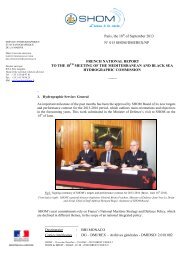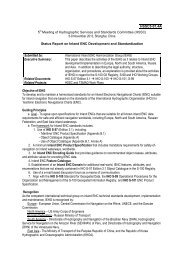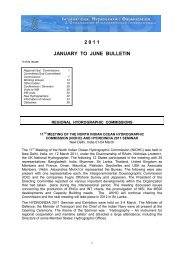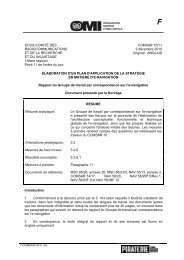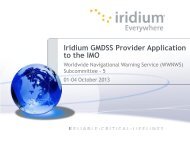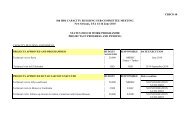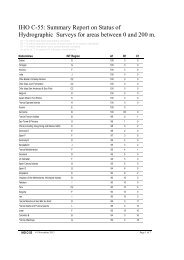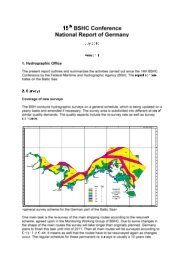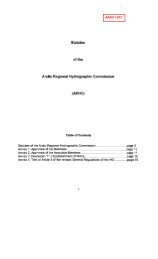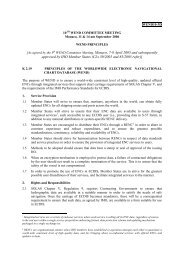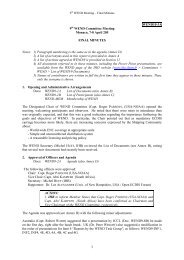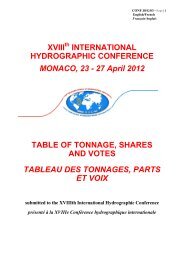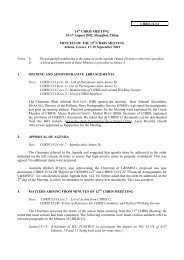Report - IHO
Report - IHO
Report - IHO
Create successful ePaper yourself
Turn your PDF publications into a flip-book with our unique Google optimized e-Paper software.
10<br />
technical visits and assessments. Co-operation must encourage the projects best suited to the<br />
situation of beneficiaries. For example, to allow hydrographers to follow course in their native<br />
language is a necessity. Moreover, States do not advance homogeneously in the establishment<br />
of a national hydrographic infrastructure. Countries that already perform a hydrographic<br />
activity need help; those that try to deliver services need continuous support effort and advice;<br />
those that do nothing need assistance to create a minimal capacity.<br />
Representatives from supporting countries and industry acknowledged that training and<br />
assistance can be customized to each country.<br />
One major concern is the sustainability of technology transfers. Training hydrographers and<br />
eventually giving them a survey boat is not sufficient. It is essential to make sure that<br />
Capacity Building will not cease at the end of co-operation programmes. On-site training,<br />
donation of the minimum equipment to enable specialists to perform their job, maintenance,<br />
faultless commitment of the beneficiaries themselves who bring the most precious<br />
contribution are the conditions of successful co-operation programmes. Moreover, supporting<br />
countries only accept to train those who will effectively work as hydrographers employed by<br />
their States in national offices.<br />
Participants were invited to express their requirements yearly through the SAIHC point of<br />
contact of Capacity Building matters in accordance with the CBSC procedures related to<br />
request of Capacity Building Funds.<br />
Developing Coastal States in the SAIHC region have to decide the level of national<br />
commitment to meet their international obligations. One of the roles of the International<br />
Hydrographic Organization is to help developing States to establish their own capability to<br />
provide at least updated hydrographic information to a charting authority in order to meet<br />
their SOLAS obligations and therefore fulfil their State responsibilities.<br />
Regional and bi-lateral co-operation is the key to acquire survey capabilities.<br />
The South Africa and Islands Hydrographic Commission is the regional hydrographic<br />
forum.<br />
The SAIHC is the access point for <strong>IHO</strong> Capacity Building and associated Funds even<br />
for non <strong>IHO</strong> Member States.<br />
The recommendations from the seminar can be summarized as follows:<br />
To continue in raising the awareness of IMO members on their (rights and) SOLAS<br />
obligations and to adopt a coherent, sustainable and consistent approach in liaison<br />
with IMO.<br />
To obtain government commitment to push that message forward in order to get the<br />
visibility and the recognition needed to take on and exercise hydrographic<br />
responsibilities.<br />
To promote and assist in the development of national hydrographic committees<br />
(national commitment).<br />
To facilitate the development of bilateral agreements with supporting countries and<br />
transition mechanisms (one size does not fit all).<br />
To involve industry in capacity development programmes.<br />
To develop partnerships with regional maritime related fora and organizations.<br />
To develop replicable programmes of work to be used by donor agencies.<br />
To encourage associate members in joining the <strong>IHO</strong>.<br />
10



